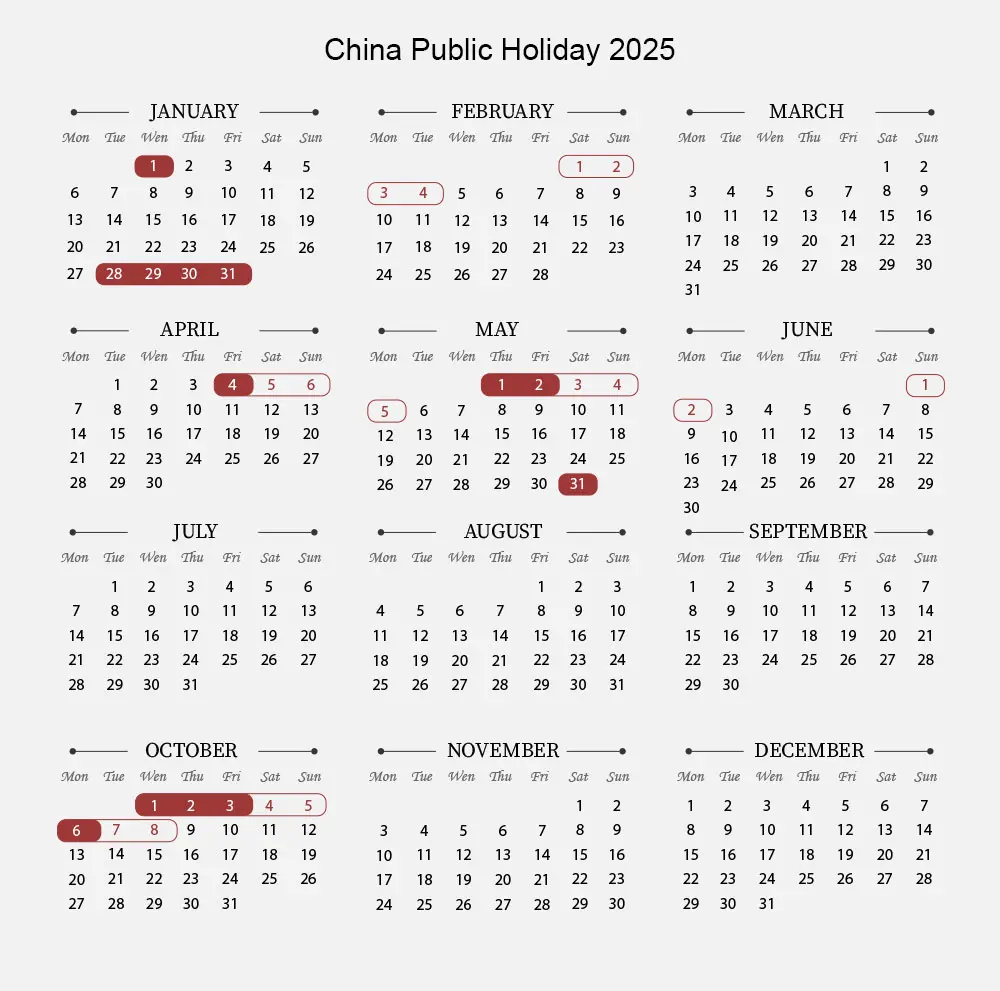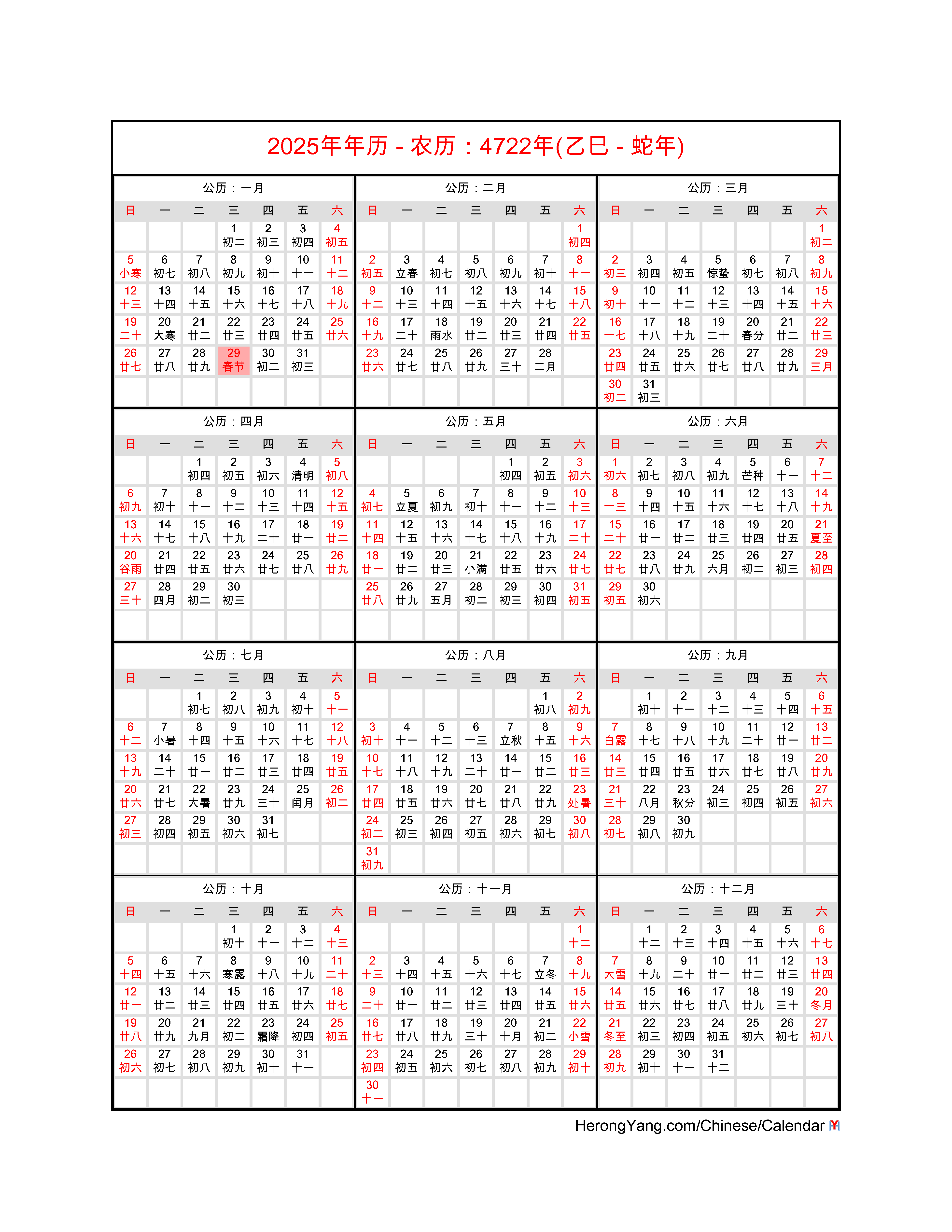Navigating The Calendar: A Comprehensive Guide To Chinese Public Holidays In 2025
Navigating the Calendar: A Comprehensive Guide to Chinese Public Holidays in 2025
Related Articles: Navigating the Calendar: A Comprehensive Guide to Chinese Public Holidays in 2025
Introduction
With great pleasure, we will explore the intriguing topic related to Navigating the Calendar: A Comprehensive Guide to Chinese Public Holidays in 2025. Let’s weave interesting information and offer fresh perspectives to the readers.
Table of Content
Navigating the Calendar: A Comprehensive Guide to Chinese Public Holidays in 2025

The People’s Republic of China observes a unique calendar of public holidays, reflecting a blend of historical significance, cultural traditions, and modern societal needs. Understanding these holidays provides insight into the rhythm of Chinese life and offers valuable information for individuals and businesses operating within the region.
Official Public Holidays in 2025:
The Chinese government designates seven official public holidays, each carrying cultural and historical weight. These are:
-
New Year’s Day (元旦节): Falling on January 1st, this holiday marks the beginning of the Gregorian calendar year. It is a relatively new addition to the Chinese holiday calendar, introduced in 1949 following the establishment of the People’s Republic of China.
-
Chinese New Year (春节): This is the most significant holiday in China, often referred to as the Spring Festival. It marks the beginning of the lunisolar Chinese calendar and is celebrated with family reunions, elaborate feasts, and vibrant cultural performances. In 2025, the Chinese New Year falls on February 10th.
-
Tomb-Sweeping Day (清明节): This day, also known as Qingming Festival, is a traditional day of remembrance for ancestors. Families visit ancestral graves, clean them, and offer food and incense as a tribute. In 2025, it falls on April 4th.
-
Labor Day (劳动节): Celebrated on May 1st, Labor Day commemorates the contributions of workers and the labor movement. It is a time for relaxation and appreciation for those who contribute to the nation’s economic prosperity.
-
Dragon Boat Festival (端午节): This festival, held on the fifth day of the fifth lunar month, commemorates the patriotic poet and minister Qu Yuan, who is believed to have drowned himself in a river to protest corruption. It is celebrated with dragon boat races, eating sticky rice dumplings (zongzi), and hanging mugwort and calamus plants to ward off evil spirits. In 2025, it falls on June 12th.
-
Mid-Autumn Festival (中秋节): This festival, celebrated on the 15th day of the eighth lunar month, is a time for family reunions and moon gazing. It is traditionally associated with the harvest moon and the sharing of mooncakes, a sweet pastry filled with various ingredients. In 2025, it falls on September 10th.
-
National Day (国庆节): This holiday, celebrated on October 1st, marks the anniversary of the founding of the People’s Republic of China in 1949. It is a time for national pride and reflection on the country’s achievements and future aspirations.
Beyond the Official Calendar:
While these seven days are officially designated as public holidays, many businesses and organizations also observe additional days off, especially during the Chinese New Year period. This often results in extended holiday periods, allowing people to travel and spend time with family.
The Importance of Public Holidays:
Chinese public holidays play a crucial role in the social fabric of the nation. They provide opportunities for:
- Family Reunions: Many Chinese people live and work far away from their families. Public holidays offer a chance for them to reunite and strengthen family bonds.
- Cultural Preservation: These holidays help preserve and celebrate China’s rich cultural heritage, ensuring that traditions are passed down through generations.
- Economic Stimulation: Public holidays contribute to domestic tourism and consumption, boosting the economy.
- Employee Well-being: Extended holidays provide employees with much-needed rest and relaxation, contributing to their overall well-being and productivity.
FAQs about Chinese Public Holidays in 2025:
Q: Are all businesses closed during public holidays?
A: While most businesses are closed during official public holidays, some essential services, such as hospitals and transportation, remain operational. It is advisable to check with individual businesses for specific operating hours.
Q: How long are the holiday periods typically?
A: The official holiday periods vary depending on the holiday. For example, the Chinese New Year typically involves a week-long holiday, while other holidays may only be a single day.
Q: What are the common customs and traditions associated with each holiday?
A: Each holiday has its unique customs and traditions. It is recommended to research the specific customs associated with each holiday to ensure respectful and culturally appropriate behavior.
Q: Are there any restrictions or regulations during public holidays?
A: During some holidays, such as the Chinese New Year, travel restrictions or special regulations might be implemented. It is important to stay informed about any relevant announcements or guidelines issued by the government.
Tips for Navigating Chinese Public Holidays in 2025:
- Plan Ahead: Booking travel and accommodation well in advance is essential, especially during peak holiday periods.
- Respect Local Customs: Familiarize yourself with the customs and traditions associated with each holiday to avoid any cultural faux pas.
- Be Prepared for Crowds: Expect increased crowds during popular holidays, particularly for travel and tourism.
- Check Business Hours: Verify the operating hours of businesses and services, as they may vary during holiday periods.
- Stay Informed: Keep up-to-date on any announcements or regulations related to public holidays.
Conclusion:
Understanding the significance and observance of Chinese public holidays provides valuable insight into the cultural landscape of China. These holidays offer a unique opportunity to experience the nation’s vibrant traditions, celebrate with locals, and gain a deeper appreciation for the cultural richness of this dynamic country. By planning ahead and respecting local customs, individuals and businesses can navigate these holidays effectively, fostering positive interactions and enriching their experiences within Chinese society.








Closure
Thus, we hope this article has provided valuable insights into Navigating the Calendar: A Comprehensive Guide to Chinese Public Holidays in 2025. We thank you for taking the time to read this article. See you in our next article!